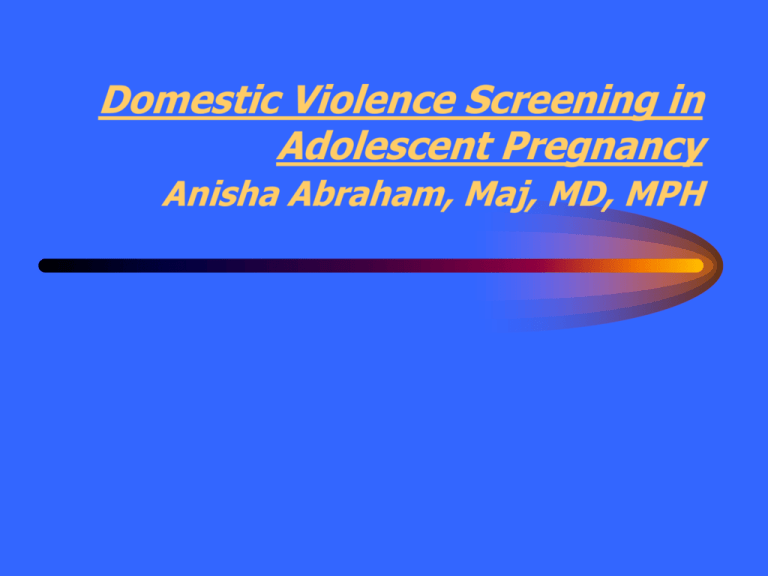
Domestic Violence Screening in
Adolescent Pregnancy
Anisha Abraham, Maj, MD, MPH
Objectives
• To provide an
overview of
domestic violence
as a public health
issue
• To review key
causes and risk
factors of domestic
violence during
Domestic Violence and Women
• Domestic violence is the leading cause of
injury to women between the ages of 15-44.
(CDC, 1999)
• Every 21 days, a woman is killed by
domestic violence. (U.S. Department of
Justice, 1998)
• More than 5 million females experience
some form of violence each year. Almost
two of every three of these females are
attacked by a relative or person known to
Domestic Violence and Women
• 34% of adults in the United States had
witnessed a man beating his wife or
girlfriend, and 14 % of women report that
they have experienced violence from a
husband or boyfriend. (U.S. Department of
Justice's National Crime Victimization
Survey, 1998)
• More than 1 million women seek medical
assistance each year for injuries caused by
Domestic Violence and Pregnancy
• The prevalence of violence during
pregnancy (all ages) ranges from 4-8%
(Gazamarian JA. Prevalence of violence
against women.. JAMA 1996)
• Higher rates are identified when screening
occurs more than once during the pregnancy
(Macfarlane J. Assessing for abuse during
pregnancy. JAMA. 1992.)
• The pattern of violence may escalate during
Violence and Teen Pregnancy
• Women < 18 yrs were twice as likely to
have experienced violence during and after
pregnancy then older women (Gessner BD.
Experience of violence in teenage mothers.
J Adolesc Health, 1999)
• 33.8% of births to unmarried teens younger
than 16yrs resulted from statutory
rape(Gessner BD, 1999)
• One-half of teens with rape histories
Violence and Teen Pregnancy
• The younger the partner the greater the
partner gap. Over one-half of infants born to
women younger than 18 yrs were fathered
by adult men .
• 40% of 15 year -olds had partners aged 20
yrs or older. (Landry DJ. How old are US
fathers? Fam Plann Perspect.1995)
• 74% girls who have had intercourse before
14yrs, reported having sex against their will
Violence and Teen Pregnancy
• Coercive sex is frequently perpetrated by
boyfriends. 53% of nonfamilial perpetrators
were adolescent girls’ boyfriends,
dates,friends (Gershenon HP.The prevalence
of coercive sex among teenage mothers. J
Interpers Viol.1989.
• 51% of girls had their first coercive act
between 13-16 yrs (Erickson PI. Unwanted
sexual experiences among high school
Domestic Violence and Children
• Children are involved in 60 percent of
domestic violence cases. More than three
million children witness acts of domestic
violence each year.
• Up to 50 percent of all homeless women
and children in this country are fleeing
domestic violence.
• More than 53 percent of male abusers beat
their children
Domestic Violence and Children
• One in ten calls made to alert police of
domestic violence is placed by a child in the
home.
• One of every three abused children becomes
an adult abuser or victim.
• Nearly 1/3 of children who witness the
battering of their mothers demonstrate
significant behavioral and emotional
problems.
Definition- Domestic Violence/Abuse
• Domestic
Violence-Injury to
another within the
context of family or
intimate
relationship
• Domestic AbuseForceful controlling
behavior that
coerces the victim
Types of Abuse
• Physical-pushing, shoving
• Psychological-ignoring, controlling,
criticizing
• Sexual-touching,calling with sexual names
sks Factors for Violence during Adolescence
•
•
•
•
•
•
Media
Drugs/Alcohol
Access to Firearms
Lack of Self-Esteem
Peer Group/School Influences
Lack of Family Support
Risk Factors for Domestic Violence In
Adolescence
•
•
•
•
•
•
•
Commitment to relationship
Fear of retaliation
No place to go
Fear of living alone
Economic dependence
Belief that they are responsible
Hope that perpetrator will change
Signs/Symptoms of Abuse among Pregnant
Teens
• Frequent somatic
complaints
(headaches,
insomnia)
• Anxiety,irritability,
crying
• Repeated visits to
the ER
• Hx of being
Signs/Symptoms among Children
(in abusive homes)
• Infants- FTT,
developmental
delays
• Toddlerseating/development
al disturbances,
clinging
• School ageincreased physical
Complications of Abuse during Pregnancy
•
•
•
•
Poor maternal weight gain
Infection
Anemia
Increased second and third- trimester
bleeding
• Miscarriage/Abortion
Barriers to Screening
•
•
•
•
•
Lack of provider recognition
Provider discomfort
Fear of offending patient
Time constraints
Feeling of powerlessness in the area of
treatment
Importance of Screening
• 90% of female patients feel their provider
can help!
• 78% favor universal inquiry about
physical/sexual assault
• 1 out of 4 women using ER’s revealed a
history of partner violence when questioned
• 10-40% of women disclose abuse when
screened by primary care providers
• 31% of mothers disclosed partner violence
Setting the Stage
•
•
•
•
•
Discuss confidentiality
Use clear language, avoid medical terms
Remain non-judgemental
Avoid talking down
Encourage discussion, use open-ended
questions
• Listen to the patient!
Screening for Domestic Violence Risks
• Has anyone close to you ever threatened
to hurt you?
• Has anyone ever hit, kicked, punched or
hurt you physically?
• Has anyone, including your partner, ever
forced to have sex against your will?
• Are you ever afraid of your partner?
Domestic Violence Counseling
• Implement
universal screening
• Acknowledge
trauma
• Assess immediate
safety
• Help establish a
safety plan
• Offer educational
Summary
• Screen: Adolescent mothers for domestic
violence risks (at prenatal visit, interval
checkups, postpartum visit, and well-baby
exams)
• Ask: Are you ever afraid of your partner?
Has anyone close to you threatened you?
Hit you ? Forced sex against your will?
• Discuss: Safety plan, legal
implications,trauma






